Our Program
Performance Opportunities
At the Baltimore Irish Music School, students have a clear path to connect with the music at any stage in their musical journey. Irish traditional music is just that: traditional, and is learned best when being handed down from a teacher and a musical community. With that being said, we have three core pillars of instruction: group classes, private instruction, and community events.
In Ireland, it is common for children to begin their instruction on the tin whistle, and we align with this by starting new students off in the group tin whistle class to learn the fundamentals of the instrument and the music. After a student has graduated from the tin whistle class, or if a new student comes in with previous experience, we encourage them to begin working with a private teacher on their instrument of choice. They are also ready for the repertoire classes, which are focused on learning by ear, building aural skills, and building a common repertoire with a community of students. Students in the repertoire classes receive regular opportunities to perform through the semester and are encouraged to attend performances and community events like sessions and concerts to better integrate themselves into, and learn from, their musical community here in Baltimore.
In the group classes, performances, and through participation in community events, students learn how to play by ear, get to know their local community, and learn how to play with them, but these things are no replacement for the relationship with a private teacher. We encourage every student to be working with a private teacher on a regular cadence to learn the technique and stylistics of their instrument even as they’re building repertoire and training their ear through group classes and sessions.
All classes are held in person in the Hampden neighborhood of Baltimore at St. Luke’s Church on the Avenue
Our Group Classes
Music Classes (aged 6-18)
In the Music Classes, students will be grouped based on age and level, and will learn local repertoire by ear from local teachers. These classes help to build community, work on ear training, and help put students on the road to playing by ear and being able to participate in sessions, performances, dances, and other Irish traditional music events. Some classes, such as our Spring ceili band classes, are geared towards competition, but most are a relaxed way for students to get to know each other and become more familiar with the music in general while learning their instrument with their private teacher.
Dance Classes (age 5+, both for kids and adults)
At BIMS, we teach dance in addition to music. Unlike the high-kicking competition dance style you might be used to, we offer lessons in old style and sean nós dancing. In these more close-to-the-floor types of dances, dancers learn the building blocks, then choreography and improvisation, and the dance is treated more like an instrument playing along with the music. While it can be danced in a group, these types of traditional dances are also very much about individual expression.
Photo Credit: Gayle Kassal
Whistle Classes (Ages 6-10)
The Whistle Classes are a way for students with no experience to start learning Irish traditional music with other students. Each semester we offer at least two group whistle classes for students of various levels. In these classes, students learn their first few tunes, as well as the basics of Irish music. While in the whistle class, students and parents should be identifying which instrument the student would like to begin working on, and students should begin working with private teachers while participating in the whistle classes.
Tunes for Tots - Suzuki Early Childhood Education (0-4)
In these Suzuki Early Childhood Education classes, children, their caregivers, and certified teachers explore musical concepts within a nurturing environment. Each child will need a guardian present for each session. Each class will be capped at 12 students, and additional registrants will be put on a wait list.
We believe that every child can learn, and they learn from one another, especially in mixed-age settings. Through critical parental involvement, modeling, and encouragement, children participate with their caregiver(s) in vocal, instrumental, movement, and rhythmic activities that create cognitive, communicative, and social development from an early age. These activities also foster a special bond between children and their caregiver.
For small group instrument instruction, time and grouping will vary and be discussed with teachers, parents, and the school.






